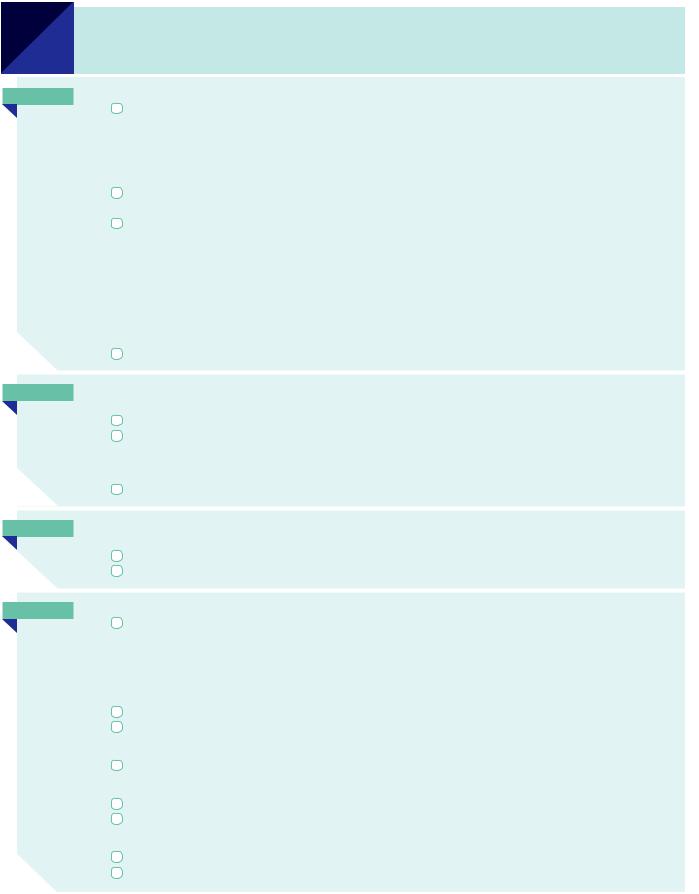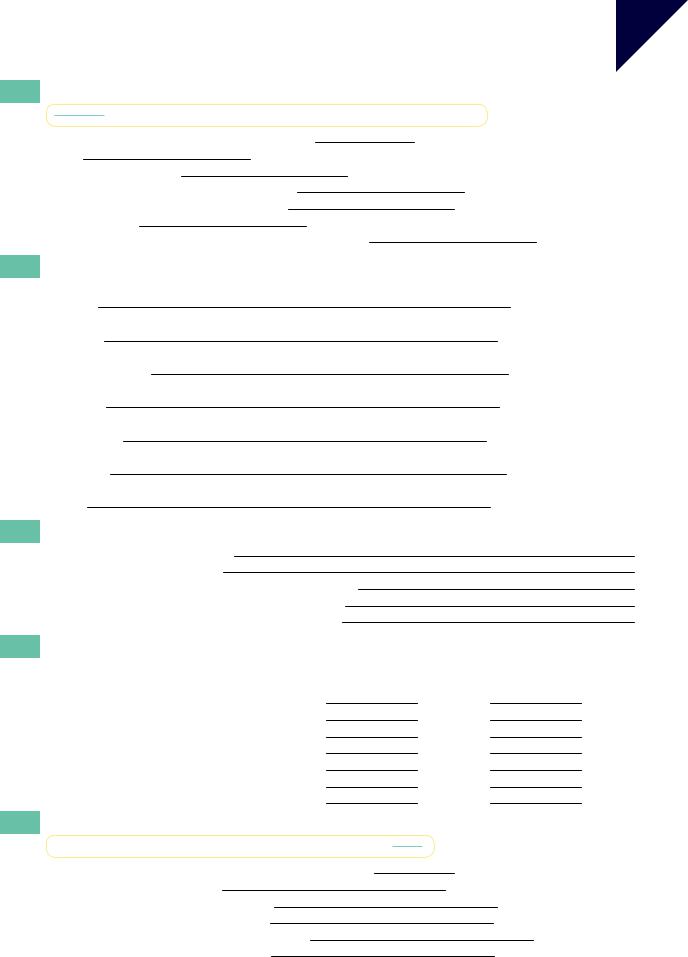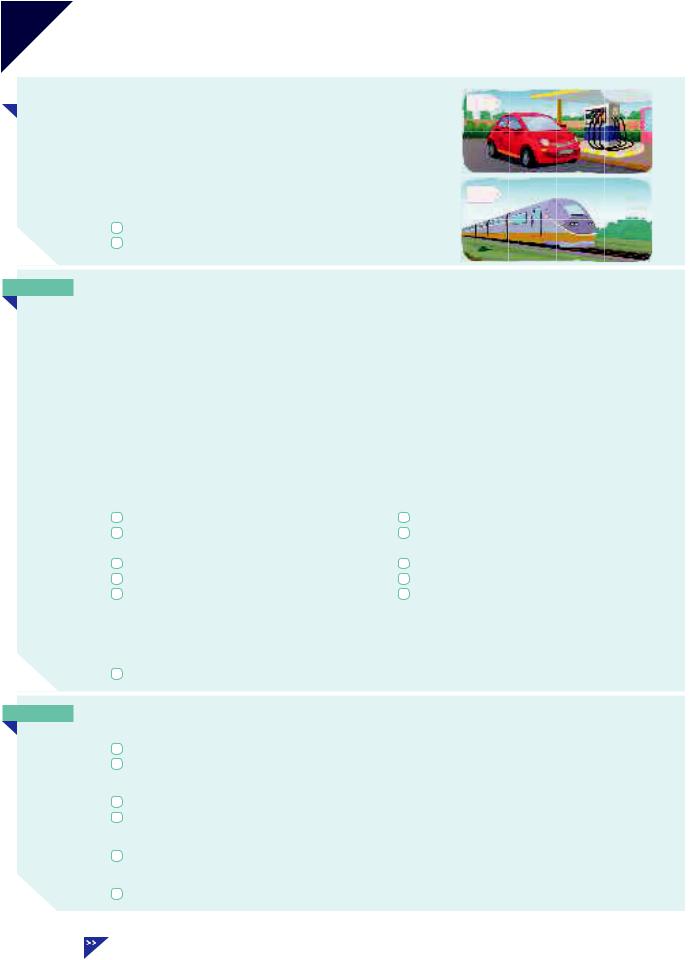
- •Contents
- •Thanks
- •To the student
- •To the teacher
- •3 Present continuous and present simple 1 (I am doing and I do)
- •10 Present perfect continuous and simple (I have been doing and I have done)
- •11 how long have you (been) … ?
- •12 for and since when … ? and how long … ?
- •13 Present perfect and past 1 (I have done and I did)
- •14 Present perfect and past 2 (I have done and I did)
- •15 Past perfect (I had done)
- •16 Past perfect continuous (I had been doing)
- •17 have and have got
- •18 used to (do)
- •19 Present tenses (I am doing / I do) for the future
- •20 I’m going to (do)
- •21 will and shall 1
- •22 will and shall 2
- •23 I will and I’m going to
- •24 will be doing and will have done
- •26 can, could and (be) able to
- •27 could (do) and could have (done)
- •28 must and can’t
- •29 may and might 1
- •30 may and might 2
- •31 have to and must
- •32 must mustn’t needn’t
- •33 should 1
- •34 should 2
- •35 I’d better … it’s time …
- •36 would
- •39 if I knew … I wish I knew …
- •40 if I had known … I wish I had known …
- •41 wish
- •42 Passive 1 (is done / was done)
- •43 Passive 2 (be done / been done / being done)
- •44 Passive 3
- •45 it is said that … he is said to … he is supposed to …
- •46 have something done
- •47 Reported speech 1 (he said that …)
- •48 Reported speech 2
- •49 Questions 1
- •52 Question tags (do you? isn’t it? etc.)
- •53 Verb + -ing (enjoy doing / stop doing etc.)
- •54 Verb + to … (decide to … / forget to … etc.)
- •55 Verb (+ object) + to … (I want you to …)
- •56 Verb + -ing or to … 1 (remember, regret etc.)
- •57 Verb + -ing or to … 2 (try, need, help)
- •58 Verb + -ing or to … 3 (like / would like etc.)
- •59 prefer and would rather
- •60 Preposition (in/for/about etc.) + -ing
- •61 be/get used to … (I’m used to …)
- •63 there’s no point in -ing, it’s worth -ing etc.
- •64 to … , for … and so that …
- •65 Adjective + to …
- •66 to … (afraid to do) and preposition + -ing (afraid of -ing)
- •67 see somebody do and see somebody doing
- •68 -ing clauses (He hurt his knee playing football.)
- •69 Countable and uncountable 1
- •70 Countable and uncountable 2
- •71 Countable nouns with a/an and some
- •74 the 2 (school / the school etc.)
- •75 the 3 (children / the children)
- •77 Names with and without the 1
- •78 Names with and without the 2
- •79 Singular and plural
- •80 Noun + noun (a bus driver / a headache)
- •81 -’s (your sister’s name) and of … (the name of the book)
- •82 myself/yourself/themselves etc.
- •83 a friend of mine my own house on my own / by myself
- •84 there … and it …
- •85 some and any
- •87 much, many, little, few, a lot, plenty
- •90 all every whole
- •91 each and every
- •92 Relative clauses 1: clauses with who/that/which
- •94 Relative clauses 3: whose/whom/where
- •95 Relative clauses 4: extra information clauses (1)
- •96 Relative clauses 5: extra information clauses (2)
- •97 -ing and -ed clauses (the woman talking to Tom, the boy injured in the accident)
- •98 Adjectives ending in -ing and -ed (boring/bored etc.)
- •99 Adjectives: a nice new house, you look tired
- •100 Adjectives and adverbs 1 (quick/quickly)
- •102 so and such
- •104 quite, pretty, rather and fairly
- •105 Comparative 1 (cheaper, more expensive etc.)
- •106 Comparative 2 (much better / any better etc.)
- •107 Comparative 3 (as … as / than)
- •108 Superlative (the longest / the most enjoyable etc.)
- •109 Word order 1: verb + object; place and time
- •110 Word order 2: adverbs with the verb
- •111 still any more yet already
- •112 even
- •114 in case
- •116 as (as I walked … / as I was … etc.)
- •117 like and as
- •119 during for while
- •121 at/on/in (time)
- •122 on time and in time at the end and in the end
- •123 in/at/on (position) 1
- •124 in/at/on (position) 2
- •125 in/at/on (position) 3
- •126 to, at, in and into
- •127 in/on/at (other uses)
- •129 Noun + preposition (reason for, cause of etc.)
- •130 Adjective + preposition 1
- •131 Adjective + preposition 2
- •132 Verb + preposition 1 to and at
- •134 Verb + preposition 3 about and of
- •135 Verb + preposition 4 of/for/from/on
- •136 Verb + preposition 5 in/into/with/to/on
- •137 Phrasal verbs 1 Introduction
- •138 Phrasal verbs 2 in/out
- •139 Phrasal verbs 3 out
- •142 Phrasal verbs 6 up/down
- •143 Phrasal verbs 7 up (1)
- •144 Phrasal verbs 8 up (2)
- •145 Phrasal verbs 9 away/back
- •Additional exercises
- •Study guide
- •Key to Exercises
- •Key to Additional exercises (see page 302)
- •Key to Study guide
- •Index

Unit
104 quite, pretty, rather and fairly
AQuite and pretty are similar in meaning (= less than ‘very’, but more than ‘a little’):
I’m surprised you haven’t heard of her. She’s quite famous. or She’s pretty famous. (= less than ‘very famous’, but more than ‘a little famous’)
 Anna lives quite near me, so we see each other pretty oten. Pretty is an informal word and is used mainly in spoken English.
Anna lives quite near me, so we see each other pretty oten. Pretty is an informal word and is used mainly in spoken English.
Quite goes before a/an:
We live in quite an old house. (not a quite old house)
Compare:
Sarah has quite a good job.
Sarah has a pretty good job.
You can also use quite (but not pretty) in the following ways: quite a/an + noun (without an adjective):
 I didn’t expect to see them. It was quite a surprise. (= quite a big surprise) quite a lot (of …):
I didn’t expect to see them. It was quite a surprise. (= quite a big surprise) quite a lot (of …):
 There were quite a lot of guests at the wedding. quite + verb, especially like and enjoy:
There were quite a lot of guests at the wedding. quite + verb, especially like and enjoy:
I quite like tennis, but it’s not my favourite sport.
BRather is similar to quite and pretty. We oten use rather for negative ideas (things we think are not
good):
The weather isn’t so good. It’s rather cloudy. Paul is rather shy. He doesn’t talk very much.
Quite is also possible in these examples.
When we use rather for positive ideas (good/nice etc.), it means ‘unusually’ or ‘surprisingly’: These oranges are rather good. Where did you get them?
CFairly is weaker than quite/rather/pretty. For example, if something is fairly good, it is not very
good and it could be better:
My room is fairly big, but I’d prefer a bigger one.
We see each other fairly oten, but not as oten as we used to.
DQuite also means ‘completely’. For example:
‘Are you sure?’ |
‘Yes, quite sure.’ (= completely sure) |
|
|
|||
Quite means ‘completely’ with a number of adjectives, especially: |
|
|
||||
|
|
|
|
|
|
|
sure |
right |
true |
clear |
diferent |
incredible |
amazing |
certain |
wrong |
safe |
obvious |
unnecessary |
extraordinary |
impossible |
|
|
|||||
She was quite diferent from what I expected. (= completely diferent) |
|
|||||
Everything they said was quite true. (= completely true) |
|
|
||||
We also use quite (= completely) with some verbs. For example: |
|
|
||||
I quite agree with you. (= I completely agree) |
|
|
||||
not quite = not completely: |
|
|
|
|
||
I don’t quite understand what you mean. |
|
|
||||
‘Are you ready yet?’ |
‘Not quite.’ (= not completely) |
|
|
|||
Compare the two meanings of quite:
The story is quite interesting. (= less than ‘very interesting’)
The story is quite true. (= completely true)
208

Exercises |
Unit |
104 |
|
|
|
104.1 Complete the sentences using quite … . Choose from:
|
famous |
hungry |
late |
noisy |
oten |
old |
surprised |
1 |
I’m surprised you haven’t heard of her. She’s quite famous . |
||||||
2 |
I’m |
|
|
. Is there anything to eat? |
|
||
3 |
We go to the cinema |
|
|
|
– maybe once a month. |
||
4 |
We live near a very busy road, so it’s oten |
|
|
. |
|||
5 |
I didn’t expect Lisa to contact me. I was |
|
|
when she phoned. |
|||
6 |
I went to bed |
|
|
last night, so I’m a bit tired this morning. |
|||
7 |
I don’t know exactly when this house was built, but it’s |
. |
|||||
104.2 Put the words in the right order to complete the sentences.
1 |
The weather was better than we had expected. |
|
|
It was quite a nice day |
(a / nice / quite / day). |
2 |
Tom likes to sing. |
|
|
He has |
(voice / quite / good / a). |
3 |
The bus stop wasn’t near the hotel. |
|
|
We had to walk |
(quite / way / a / long). |
4 |
It’s not so warm today. |
|
|
There’s |
(a / wind / cold / pretty). |
5 |
The roads were busy. |
|
|
There was |
(lot / trafic / a / of / quite). |
6 |
I’m tired. |
|
|
I’ve had |
(pretty / day / a / busy). |
7 |
Sarah hasn’t been working here long. |
|
|
She |
(fairly / started / recently). |
104.3 Use your own ideas to complete these sentences. Use rather + adjective.
1 The weather isn’t so good. It’s rather cloudy
2 I enjoyed the film, but it was
3 Chris went away without telling anybody, which was
4 Lucy doesn’t like having to wait. Sometimes she’s
5 They have some lovely things in this shop, but it’s
104.4What does quite mean in these sentences? Tick ( ) the right meaning.
1 |
It’s quite cold. You need a coat. |
2 |
‘Are you sure?’ ‘Yes, quite sure.’ |
3 |
Anna’s English is quite good. |
4 |
I couldn’t believe it. It was quite incredible. |
5 |
My bedroom is quite big. |
6 |
I’m quite tired. I think I’ll go to bed. |
7 |
I quite agree with you. |
more than ‘a little’, less than ‘very’ (Section A)
.
.
.
.
.
‘completely’ (Section D)
104.5 Complete these sentences using quite … . Choose from:
|
diferent |
impossible |
right |
safe |
sure |
true |
1 |
I didn’t believe her at first, but in fact what she said was |
quite true . |
||||
2 |
You won’t fall. The ladder is |
|
|
|
. |
|
3 |
I’m afraid I can’t do what you ask. It’s |
|
|
. |
||
4 |
I completely agree with you. You are |
|
|
. |
||
5 |
You can’t compare the two things. They are |
|
. |
|||
6 |
I think I saw them go out, but I’m not |
|
|
. |
||
209

|
Unit |
|
|
|
|
|
Comparative 1 (cheaper, more expensive etc.) |
||
|
105 |
|
||
|
|
|
|
|
|
|
|
Look at these examples: |
|
|
A |
|
||
|
|
|
|
£36 |
|
|
How shall we travel? Shall we drive or go by train? |
||
|
|
|
|
|
|
|
|
Let’s drive. It’s cheaper. |
|
|
|
|
Don’t go by train. It’s more expensive. |
|
|
|
|
Cheaper and more expensive are comparative forms. |
|
|
|
|
|
£52 |
|
|
|
||
|
|
|
Ater comparatives you can use than (see Unit 107): |
|
|
|
|
It’s cheaper to drive than go by train. |
|
|
|
|
Going by train is more expensive than driving. |
|
BThe comparative form is -er or more … .
We use -er for short words (one syllable): |
|
We use more … for longer words (two |
||
cheap → cheaper |
fast → faster |
|
syllables or more): |
|
|
more serious |
more expensive |
||
large → larger |
thin → thinner |
|
more oten |
more comfortable |
We also use -er for two-syllable words that |
|
We also use more … for adverbs that end |
||
end in -y (-y → -ier): |
|
|
in -ly: |
|
lucky → luckier |
early → earlier |
|
more slowly |
more seriously |
easy → easier |
pretty → prettier |
|
more easily |
more quietly |
For spelling, see Appendix 6. |
|
|
|
|
|
|
|
|
|
Compare these examples: |
|
|
|
|
|
|
|
||
You’re older than me. |
|
You’re more patient than me. |
||
The exam was quite easy – easier than |
|
The exam was quite dif icult – more |
||
I expected. |
|
|
dificult than I expected. |
|
Can you walk a bit faster? |
|
Can you walk a bit more slowly? |
||
I’d like to have a bigger car. |
|
I’d like to have a more reliable car. |
||
Last night I went to bed earlier than |
|
I don’t play tennis much these days. |
||
usual. |
|
|
I used to play more oten. |
|
|
|
|
|
|
|
|
|
|
|
We use both -er or more … with some two-syllable adjectives, especially: clever narrow quiet shallow simple
It’s too noisy here. Can we go somewhere quieter? or … somewhere more quiet?
CA few adjectives and adverbs have irregular comparative forms:
good/well → better
The garden looks better since you tidied it up.
I know him well – probably better than anybody else knows him.
bad/badly → worse
‘How’s your headache? Better?’ ‘No, it’s worse.’
He did very badly in the exam – worse than expected.
far → further (or farther)
It’s a long walk from here to the park – further than I thought. (or farther than)
Note that further (but not farther) also means ‘more’ or ‘additional’:
Let me know if you hear any further news. (= any more news)
210 |
Comparative 2–3 Units 106–107 Superlative (cheapest / most expensive etc.) Unit 108 |

Exercises
105.1 Complete the sentences using a comparative form (older / more important etc.).
1 |
This restaurant is very expensive. Let’s go somewhere cheaper |
2 |
This cofee is very weak. I like it |
3 |
The town was surprisingly big. I expected it to be |
4 |
The hotel was surprisingly cheap. I expected it to be |
5 |
The weather is too cold here. I’d like to live somewhere |
6 |
Sometimes my job is a bit boring. I’d like to do something |
7 |
It’s a shame you live so far away. I wish you lived |
8 |
It was quite easy to find a place to live. I thought it would be |
9 |
Your work isn’t very good. I’m sure you can do |
10Don’t worry. The situation isn’t so bad. It could be
11You hardly ever call me. Why don’t you call me
12You’re too near the camera. Can you move a bit
.
.
.
.
.
.
.
.
.
.
?
away?
105.2Complete the sentences. Use the comparative forms of the words in the box. Use than where necessary.
big early high important interested peaceful reliable serious slowly thin
Unit
105
1 |
I was feeling tired last night, so I went to bed |
earlier than usual. |
2 |
I’d like to have a more reliable car. The one I have keeps breaking down. |
|
3 |
Unfortunately the problem was |
we thought at first. |
4 |
You look |
. Have you lost weight? |
5 |
We don’t have enough space here. We need a |
apartment. |
6 |
James doesn’t study very hard. He’s |
in having a good time. |
7 |
Health and happiness are |
money. |
8 |
I like living in the country. It’s |
living in a town. |
9 |
I’m sorry I don’t understand. Can you speak |
, please? |
10 |
In some parts of the country, prices are |
in others. |
105.3 Complete the sentences. Choose from:
|
than |
more |
worse |
quietly |
longer |
better |
careful |
frequent |
1 |
Getting a visa was complicated. It took |
longer than I expected. |
|
|
||||
2 |
Sorry about my mistake. I’ll try and be more |
|
in future. |
|||||
3 |
Your English has improved. It’s |
|
|
than it was. |
|
|||
4 |
You can travel by bus or by train. The buses are more |
|
|
than the trains. |
||||
5 |
You can’t always have things immediately. You have to be |
|
patient. |
|||||
6 |
I’m a pessimist. I always think things are going to get |
|
|
. |
||||
7 |
We were busier |
|
|
usual in the ofice today. It’s not usually so busy. |
||||
8 |
You’re talking very loudly. Can you speak more |
|
|
? |
||||
105.4 Read the situations and complete the sentences. Use a comparative form (-er or more …).
1 |
Yesterday the temperature was six degrees. Today it’s only three degrees. |
|
|
|
It’s colder today than |
it was yesterday. |
|
2 |
Dan and I went for a run. I ran ten kilometres. Dan stopped ater eight kilometres. |
||
|
I ran |
Dan. |
|
3 |
The journey takes four hours by car and five hours by train. |
|
|
|
The journey takes |
train |
car. |
4 |
I expected my friends to arrive at about 4 o’clock. In fact they arrived at 2.30. |
|
|
|
My friends |
I expected. |
|
5 |
There is always a lot of trafic here, but today the trafic is really bad. |
|
|
|
The trafic today |
usual. |
|
211
